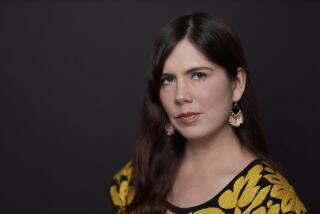Review: Amid a real drought, thriller ‘Water Knife’ cuts to the quick
Reading Paolo Bacigalupi’s richly imagined novel “The Water Knife” brings to mind the movie “Chinatown.” Although one is set in the past and the other in a dystopian future, both are neo-noir tales with jaded antiheroes and ruthless kingpins who wield water as lethal weapons to control life — and mete out death.
But while “Chinatown” gave us a languorous L.A. where a William Mulholland-like patriarch plots to bring Owens Valley water south, “The Water Knife” is set in a parched Southwest about 15 minutes into the future ruled by the “Queen of the Colorado.” Her Machiavellian schemes make L.A.’s historic water grab look like a kid stealing candy.
Moving through this derelict world of abandoned subdivisions, dust storms and shifting allegiances is Angel Velasquez, a water company assassin, or “Water Knife.” In the dying city of Phoenix, now a Third World outpost swarming with refugees, spies, narcos, hustlers and aid workers, he meets Lucy Monroe, a Pulitzer-winning journalist come to document the collapse and confront her own demons. Then there’s wild card Maria Villarosa, a teen refugee desperate to escape the razor-wired, militia-patrolled border into a greener world.
Throw in some legendary water rights everyone is chasing that leave a lot of mutilated corpses in their wake and Bacigalupi is off and running with this fresh, genre-bending thriller.
Bacigalupi, who writes for kids and adults in books such as “The Windup Girl” and “Shipbreaker,” has won the Locus, Hugo, Nebula and YA Printz awards. He weaves page-turning action with zeitgeisty themes like gene-hacked crops, famine, drought, rising water levels, geisha sexbots with human emotions, and public-relations “doubt factories” that defend corporate profits at the cost of lives.
Like the best sci-fi, “The Water Knife” has its own vocabulary and rituals but is rooted in a familiar world. There are REI dust goggles, the Kindle Post and hashtags. Mexico and Latin America have morphed into the Cartel States. A Texas cult called the Merry Perrys prepares for end days, and everyone else prays to Santa Muerte, a.k.a. the Skinny Lady.
In this new world order, water companies operate like rogue states with private militias to guard aqueducts and keep out desperate refugees, especially Texans, whose state imploded after their water was cut off. Everyone dreams of a residency permit in L.A. or Las Vegas, where the rich live in high-rise green arcologies (“where Chinese ingenuity and narco-interests collide”) and the “Hanging Gardens of Las Vegas” is an international tourist attraction like ancient Babylon.
Meanwhile, “zoners” live in dark suburbs where electricity, running water and A/C are distant memories, “johnnysacs” provide the ultimate recycling and Texas bangbang girls gesturing on the dusty highway can be bought for an air-conditioned meal and the ultimate luxury — a shower.
Bacigalupi’s use of water as sacred currency evokes Frank Herbert’s “Dune.” The casual violence and slang may bring to mind “A Clockwork Orange.” The book’s nervous energy recalls William Gibson at his cyberpunk best. Its visual imagery evokes Dust Bowl Okies in the Great Depression and the catastrophic 1928 failure of the St. Francis Dam that killed 600 people and haunted its builder, Mulholland, into the grave.
But this is no pastiche; Bacigalupi weaves an engrossing tale all his own, crackling with edgy style. And he makes water politics sexy, laying down the jargon and technical details early, then hurrying back to the action-filled streets. Still, the ultimate villains here aren’t the hired assassins or lowly water engineers but the faceless corporate owners who play God, deciding if entire regions live or die.
“The Water Knife” grew out of a short story, “The Tamarisk Hunters,” that first appeared in the environmental journal High Country News. In that story, Bacigalupi imagined a drought-plagued Southwest where “water ticks” eked out a dessicated existence next to an aqueduct that hurtled water to the wealthy, sealed-off city of Los Angeles. The penalty for stealing water: forced labor and death.
Reading the novel in 93-degree March weather while L.A. newscasts warned of water rationing and extended drought, I felt the hot panting breath of the desert on my nape and I shivered, hoping that Bacigalupi’s vision of the future won’t be ours.
Hamilton is an L.A. crime writer and editor of the Edgar-winning short-story anthology “Los Angeles Noir.”
The Water Knife
A Novel
Paolo Bacigalupi
Alfred A. Knopf: 384 pp., $25.95
More to Read
Sign up for our Book Club newsletter
Get the latest news, events and more from the Los Angeles Times Book Club, and help us get L.A. reading and talking.
You may occasionally receive promotional content from the Los Angeles Times.






